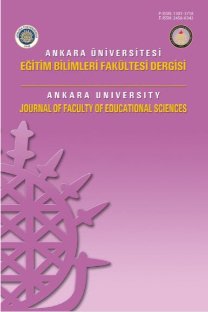Web 2.0 online collaboration tools as environments for task-based writing instruction
Task-based Teaching, Web 2.0, writing instruction
- ISSN: 1301-3718
- Yayın Aralığı: 3
- Başlangıç: 1968
- Yayıncı: ANKARA ÜNİVERSİTESİ (EĞİTİM BİLİMLERİ FAKÜLTESİ)
An oral history try on the process of the foundation of Ankara University Faculty of Education
Çiğdem KILIÇ, Sinan OLKUN, Hatice OLKUN
Web 2.0 online collaboration tools as environments for task-based writing instruction
Primary school second grade mathematic teachers’ feedback strategies to students’ mistakes
Đlköğretim Öğrencilerinin Tarihsel Bilgiye Yönelik Görüşlerini Belirleme Ölçeği
An overview of the Swedish Education System and supervision
Prof. Dr. Cevat ALKAN through the eyes of his students
Necmettin TEKER, Salih BARDAKCI, Gülcan NUMANOĞLU, Mehmet KURT
